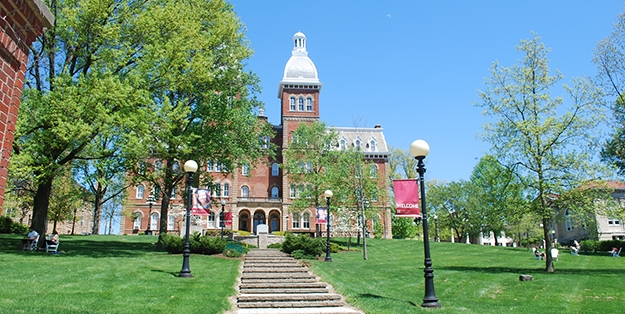You have /5 articles left.
Sign up for a free account or log in.

Washington & Jefferson College
Washington & Jefferson College leaders want to make sure a new foray into graduate education doesn’t cause an identity crisis.
The small, 1,400-student liberal arts college about 45 minutes southwest of Pittsburgh announced in January it was starting new graduate programs in applied health care economics, professional writing, professional accounting and thanatology -- the study of death, dying and bereavement. The move represents the institution’s first foray since 1984 into master’s degrees, and it only came after years of discussion about how to best meet a changing higher education market.
This summer, Washington & Jefferson held some of its first new graduate classes. But it is also still planning the launch of several of the programs announced in January. And it will remain open to tweaks and changes if, say, students prove more interested in certificate programs.
The college’s leaders are clear: they want to keep the graduate programs small, and they do not want them to infringe on Washington & Jefferson’s traditional focus on residential undergraduate education. In short, Washington & Jefferson is taking things slowly and trying not to overextend its resources as it finds its way forward in a still-changing market.
The cautious pace contrasts with some liberal arts colleges that have pushed into graduate and professional education with online-heavy offerings after seeing a tightening residential undergraduate market. Even so, a college like Washington & Jefferson, with a strong academic reputation but financial assets that won't be confused with the largest endowments in the country, has reason to watch the broader market and try changes. It’s a strategy experts see more colleges and universities following as degree growth tilts more toward master’s degrees and student populations become older and more diverse.
“We feel this is an important time for small colleges to expand their curriculum,” said Tori Haring-Smith, Washington & Jefferson’s president. “It not only helps our visibility to have these graduate programs -- and obviously our reputation -- but it provides an opportunity for us to build upon our strengths.”
The four graduate programs being started each come from Washington & Jefferson’s traditional expertise, Haring-Smith said. She traced the roots of their creation all the way back to 2010, when leaders considered a number of different ways for the college to position itself for the future. Options considered ranged from creating a law school to starting a nursing program.
New graduate programs could be useful for Washington & Jefferson undergraduates who might be interested in additional education after they finish their bachelor’s degrees, college leaders said. They could also be attractive to alumni and other professionals.
And they have the benefit of being low-risk start-ups. You can’t start a law school with six students and no major administrative additions. But you can create small graduate programs if you have strong faculty members and support staff already on campus.
For instance, additional costs to start the applied health care economics program run in the tens of thousands of dollars per year, not counting some institutional costs like information technology staff time, Haring-Smith said. The programs won’t be major revenue centers -- they won’t be large enough. Still, plans call for them to be breaking even in two to three years.
Professional writing started with about three students over the summer, although it’s expected to grow. Applied health care economics will likely start with half a dozen this fall. Accounting, which specifically includes preparation for the certified public accountant examination, will probably start with a dozen next summer, although some at the college think cohorts could grow to be two or nearly three times that size. Thanatology, which is listed as a certificate program and is designed for professionals in funeral homes, hospitals and counseling, as well as other individuals, will likely enroll cohorts of about seven and has already posted scheduled sessions.
A key goal is keeping the undergraduate experience from changing, said Haring-Smith, who plans to retire in the summer of 2017 after leading the college since 2005. Faculty members should not be turning away from undergraduates to focus on their graduate classes, she said.
“I say students and undergraduates at Washington & Jefferson should not know on a daily basis that we have graduate programs,” Haring-Smith said. “They should know intellectually it’s there, it’s an opportunity for them, but they should not be bumping against it day in and day out.”
Yet she also acknowledged that some may be worried the institution is straying from its traditional mission.
“On campus, there are individuals who worry about mission creep, no doubt about it,” Haring-Smith said. “That’s an important voice, and it’s an important question for us to keep asking.”
The question is heavy on the mind of one of the faculty members tasked with getting a graduate program off the ground. Kathleen McEvoy is an associate English professor and director of Washington & Jefferson’s graduate program in professional writing.
She believes the graduate program can enhance the experience for undergraduates. Starting the graduate writing program this summer allowed McEvoy to reach out to professionals she wants to teach as adjunct professors, she said. Those professionals may not come just to teach one undergraduate class, but they might be interested in the prospect of teaching both an undergraduate course and a graduate course.
“We’re outside of Pittsburgh, and a lot of the people we’re looking at for these adjunct positions live in Pittsburgh,” McEvoy said. “To convince them to drive 45 minutes to an hour to teach one class, it can be a hard sell.”
Faculty members can also benefit from new experiences, said Samuel Fee, a professor who chairs the college’s computing and information studies department and taught a graduate class in web design and development this summer. The class, which is part of the graduate professional writing program curriculum, was designed to teach students to write content for online audiences, to code and to design websites.
It’s gone well, with students seeming motivated and interested, Fee said in an email, which let him lead deeper classroom discussions. He took student feedback into account from the very start of the course.
“I took a little time at the beginning of the course to learn what students were interested in knowing and then modified the class a bit from my original planning to suit,” he said.
McEvoy hopes her program can have 15 students a year from now on. She projects awarding the first master’s degree in December 2017, because students are juggling class and working full time.
Washington & Jefferson trying to strike the delicate balance of marketing new graduate programs while still keeping its bread-and-butter undergraduates at the center of operations is a challenge, McEvoy said.
“The big difficulty is that Washington & Jefferson has a very specific reputation in the region,” McEvoy said. “It’s a good reputation, but it’s the reputation of an undergraduate institution. It’s been three decades since we offered master’s degrees, and from my understanding, a lot of people weren’t aware that we offered master’s degrees back then.”
Institutions will naturally face questions of identity when starting new programs, said Carla Hickman, managing director of research with the education research firm EAB. It is important to acknowledge them, she said.
“If you are going to pursue graduates for the first time, if you are going to pursue, really, a new kind of credential that you have not historically done, that comes down to, I think, a question of scale,” Hickman said. “It just needs to be a conversation about who we are.”
The trend is for colleges and universities to think about new student audiences or accessing new markets, Hickman said. Institutions are thinking about both their own strengths and the surrounding market.
“What we have seen is a growing number of institutions who are also looking at things like labor market analytics,” Hickman said. “Do we have a good sense of how industries are shifting and changing and what specific skills the professionals in this area might benefit from?”
Washington & Jefferson’s plans seem to fit with another data point -- projected growth in master’s degrees.
The total number of master’s degrees awarded is expected to jump 37 percent between 2011-12 and 2023-24, according to National Center for Education Statistics projections. That compares to a 15 percent projected increase for bachelor’s degrees.
Washington & Jefferson is aware of expected demographic changes, said Robert Gould, vice president for enrollment.
“Being an undergraduate institution of about 1,400 students, we’re well aware of the demographic shift,” he said. “So we’re thinking about this as smart from a portfolio perspective, maintaining market share.”
The option of earning both a bachelor’s degree and a master’s degree in five years could be of great value to students, Gould said. He also sees potential for the graduate programs to attract community college transfers interested in eventually earning master’s degrees.
At the end of the day, though, the goal isn’t to grow the graduate program too much, Gould said. The aim is small, targeted programs, according to Judy Kirkpatrick, Washington & Jefferson’s vice president of academic affairs.
“We don’t need one more vanilla M.B.A. [in the market],” Kirkpatrick said. “We’re talking coming from the liberal arts arena to really look at niche programs.”
The programs don’t necessarily need to generate a high number of master’s degrees to be successful, Kirkpatrick said. Students can also find professional certificates to be valuable, she said.
Washington & Jefferson’s strategy isn’t typical, but it isn’t unheard of, either, said Ron Mahurin, vice president for strategy and planning at the higher education marketing and research firm Stamats. He expects to see similar moves at many institutions.
“Places like Washington & Jefferson, the sort of small- to midsized liberal arts colleges, they’re not adding these because they want to build out some sort of publishing and research portfolio for their faculty,” Mahurin said. “We are seeing more and more of this. ‘How do we leverage faculty expertise and build out some new academic programs in spaces where we believe there may be market opportunities?’”




